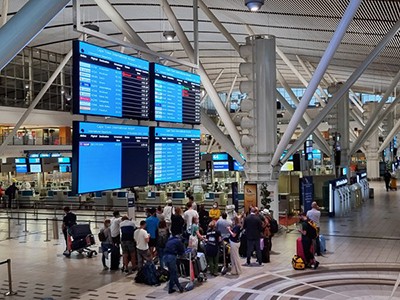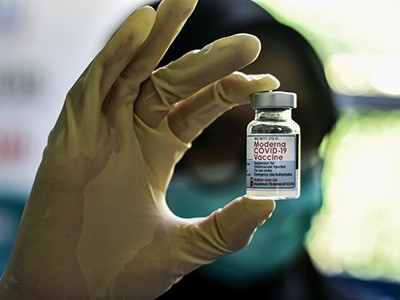It is understandable, from a political and public health perspective, that wealthy countries would want to secure supplies of vaccine for their citizens. What is less defensible is the unwillingness - especially by European countries and vaccine makers - to waive intellectual property rights on a short term basis in order to expand manufacturing capacity and distribution to forestall the emergence of further, ever more dangerous, variants. JL
Nature reports:
So long as wealthy nations insist on buying up most of the available vaccine stock without agreeing to provide more manufacturing capacity, new variants such as Omicron continue to arise. Countries with many fully vaccinated people are placing new vaccine orders but only 6% of people in low-income countries have had one dose. More than 100 countries (including both China and the United States) and hundreds of organizations are supporting a campaign backed by the WHO, to temporarily waive intellectual-property (IP) rights to COVID-19 vaccines and drugs.The arrival of Omicron — a newly discovered, highly mutated coronavirus variant that seems to be highly transmissible — is creating unease, uncertainty and disruption. The response from world leaders, especially those from high-income countries, is making things worse.
Travel restrictions are back, even though some have questionable efficacy when transmission of the virus is high. Countries with many fully vaccinated people are placing new vaccine orders — but only 6% of people in low-income countries have had one dose. Tulio de Oliveira at South Africa’s Centre for Epidemic Response and Innovation in Stellenbosch, who leads the team that alerted the world to Omicron, tweeted that African researchers had shared their COVID-19 data. Vaccines and diagnostics will come, but high-income countries will be the first to benefit.
Scientists know that this cycle will prolong the pandemic — but world leaders are still failing to choose the fastest path out. European Union member states are instead focusing their energies on drafting a new international accord, or possibly a legally binding treaty. It would create rules to facilitate cooperation between countries during a pandemic, so that the next crisis can be better handled and no country will be left behind when it comes to diagnostics and treatment. That project passed a huge milestone last week: the World Health Assembly, a meeting of health ministers from around the world, formally agreed to begin talks.
The World Health Organization (WHO) has voiced its strong support for a treaty, accord or other international instrument that might push leaders to follow the organization’s public-health recommendations on sharing data and vaccines. But in the timeline laid out at the assembly, this pact wouldn’t be up for adoption until 2024 — and its passing is not a given.
That is why more than 100 countries (including both China and the United States) and hundreds of organizations, including Nature, are supporting a campaign, led by India and South Africa and backed by the WHO, to temporarily waive intellectual-property (IP) rights to COVID-19 vaccines and drugs. The design and development of such therapies is concentrated in a relatively small number of companies that hold key patents, along with the US government. IP scholars such as Luke McDonagh at the London School of Economics and Political Science say IP relief for the duration of the pandemic will kick-start vaccine manufacturing around the world. But the EU is resisting, partly because of the strength of opposition from European pharmaceutical companies that fear they will lose their market share if their competitors are allowed to use their designs. But another way is possible.
The COVID-19 Vaccines Global Access (COVAX) scheme for providing vaccines to low-income countries needs a shot in the arm. When donor countries, philanthropic foundations and the WHO established COVAX at the start of the pandemic, they had a vision captured in the slogan “no one is safe until everyone is safe”. The plan was for the world to be vaccinated step by step, starting with the most vulnerable populations.
This never happened. Donor governments promised vaccines to COVAX while conducting parallel negotiations with companies, in some cases ordering many more doses than they needed. COVAX was not the priority, and it showed: the scheme had promised to provide 2 billion doses by the end of this year, but by July it had delivered only 95 million.
With populations in high-income nations largely vaccinated, COVAX looks to be turning a corner and will have delivered around 600 million vaccines by the end of the month. But these green shoots could be short-lived now that Omicron is prompting high-income nations to once more place large vaccine orders, especially for Omicron-specific vaccines based on messenger RNA. So long as this cycle continues, low- and lower-middle-income countries will always be at the back of the vaccines queue.
David Heymann, a long-standing science adviser to the WHO, says COVAX needs a high-profile global figure — someone of the stature of a leader of one of the G7 group of wealthy nations — to head it. Someone with the contacts, heft, star power and skills to knock heads together to hammer out a global solution to vaccinating the world, including compelling pharmaceutical company executives to agree that IP has to be shared, as happened with HIV drugs. This is not a criticism of COVAX’s present leadership, Heymann emphasized — but adjustments are needed.
For a short while this year, researchers were optimistic that the pandemic might end at the end of 2022. But Andrea Taylor, who leads a COVID-19 data team at the Duke Global Health Innovation Center in Durham, North Carolina, says that will be pushed back until 2023 or even 2024, so long as wealthy nations insist on buying up most of the available vaccine stock without agreeing to provide more manufacturing capacity, and as new variants such as Omicron continue to arise. “We are taking the least efficient pathway out of the pandemic,” she laments.
It’s an inescapable reality and an almost iron-clad law: the pandemic will not end while vaccine equity is pushed to the margins.






















0 comments:
Post a Comment